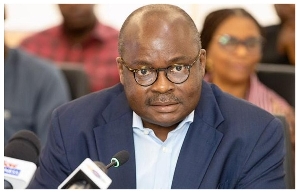- Home - News
- TWI News | TV
- Polls
- Year In Review
- News Archive
- Crime & Punishment
- Politics
- Regional
- Editorial
- Health
- Ghanaians Abroad
- Tabloid
- Africa
- Religion
- Election 2020
- Coronavirus
- News Videos | TV
- Photo Archives
- News Headlines
- Press Release
General News of Friday, 26 June 2009
Source: GNA
World Vision to address water and sanitation
Savelugu (N/R), June 26, GNA - Mr. Stephen Sumani Nayina, Northern Regional Minister, has called for more efforts by stakeholders and donors to eliminate the remaining cases of guinea worm in the country. He said Ghana's aim of achieving the United Nations Development Goals (MDGs) would remain a mirage if adequate measures were not put in place to eliminate poverty, disease and hunger as well as guinea worm. Mr. Nayina said this on Thursday at the launch of a National Start-up Workshop organized by World Vision-Ghana aimed at addressing water, sanitation and hygiene problems in its operational areas. The programme, known as the Water and Sanitation Hygiene for Human development (WASH), is the Phase V (five) of World Vision-Ghana programmes and also aims at providing clean drinking water to rural communities in its operational areas in Northern, Upper East and Upper West regions.
The programme will drill 180 wells, provide eight alternative systems to mechanize high yielding boreholes in large communities, schools and health canters, provide rain catchments systems for communities and institutions and provide small-scale dams and would rehabilitate broken dams and silted dugouts.
Mr. Nayina commended World Vision-Ghana for its contribution to the development and growth of the Northern Region and that its programmes are in line with government's efforts of poverty reduction. He said water and sanitation were serious problems facing the region, which had resulted in the re-emergence of guinea worm. He said the Central Gonja District recorded 110 out of the 147 cases recorded nationwide in the first quarter of 2009.
Mr. Albert Abongo, the Minister for Water Resources, Works and Housing, in a speech read on his behalf reiterated government's determination to provide potable water to all Ghanaians. He said the goal of World Vision WASH initiative, which is geared towards the health and sanitation, was in line with the government's vision of a "Better Ghana" and called for more collaboration to implement programmes that would benefit Ghanaians.
Mr Abongo said the provision of portable water without the corresponding promotion of improved sanitation and good hygiene practices was a venture in futility and commended World Vision for the intention to provide household latrines.
Mr. Basilio Okello, National Director of World Vision, assured rural communities of World Vision's support to improve their health status. He said the WASH project, which is expected to last up to the year 2012, would also provide some 1,120 household latrines and soak aways in and around the households as way of improving sanitation.










